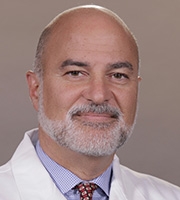Mitral Valve Care at Columbia

At Columbia, we are here to ensure that your mitral valve disease can be treated successfully with the most modern procedures, performed by the most experienced heart valve surgeons in the country. If you choose us for your mitral valve care, you can feel confident knowing:
- We were one of the first hospitals in the country to start providing mitral valve care 50 years ago, and remain one of the most active and high-performing mitral valve teams in the United States.
- Many of the treatments heart specialists around the world use today were first pioneered, evaluated, and refined by our team at Columbia.
- Today we are among the safest centers to offer this kind of care, with complication rates and success rates that far outperform national averages--even while we take on the most complex cases.
Did you know we can offer virtual visits in the comfort of your own home? Fill out our online appointment request form and we’ll give you a call to discuss your mitral valve options or call (212) 305-2633.
OUR MITRAL VALVE SERVICES & PROCEDURES
Our goal is to provide contemporary treatment of mitral valve disease, which often includes a wide spectrum of care options including medical therapies, surgical treatments, and catheter-based procedures. This multidisciplinary approach allows us to tailor treatment unique to your condition and anatomy to provide you with the best outcomes and the best experience.
Minimally Invasive Surgery
There are two types of surgical procedures that treat mitral valve disease: mitral valve repair and mitral valve replacement.
In a mitral valve repair, the diseased and damaged valve is rebuilt to restore normal function. Because this approach does not require insertion of an artificial valve into the heart, it is the best approach when possible. Although only a small fraction of cardiac surgeons are facile with these techniques, our surgeons have extensive experience with mitral valve repair, which is the most important predictor of a successful repair.
In cases where the damage to the valve is more severe and repair is not an option, the valve can be replaced. In mitral valve replacement, the valve is completely replaced with either a bioprosthetic (animal tissue) or a mechanical valve. These new valves mimic the function of a normal valve, and the specific type is tailored to each patient, to fit their needs and circumstances.
With more than 25 years of experience in performing, evaluating, and refining a wide range of cardiac surgical procedures, our team is an international leader in mitral valve repair techniques, and our cardiac surgeons perform more than 180 mitral valve operations each year.
Our outcomes in mitral valve surgery remain among the best in the world:
- Over the past for years, we have had zero deaths or major complications for mitral valve repair
- Our observed mortality rate is two-thirds less than the predicted national average for high-risk mitral valve procedures due in part to our expertise in reoperations and high-risk cases
Our cardiac surgeons have also been at the forefront in developing minimally invasive approaches for mitral valve surgery – including less invasive mini-thoracotomy and robotic procedures – with great success. We always aim to make every operation as minimally invasive as possible, which leads to shorter hospitalizations and faster recoveries.
Transcatheter Valve Therapy
Columbia’s team has been leading the development of catheter-based approaches to heart valve repairs and replacements, allowing those who are higher-risk access to lifesaving surgery.
Transcatheter mitral valve repairs are procedures performed through the arteries and veins of your leg. These procedures can correct different anatomic problems with the valve structures, such as an enlarged mitral annulus, a leaflet that is not working, or other issues. If a valve is not repairable, new systems to replace the entire valve can be offered as part of a transcatheter mitral valve replacement. In this procedure, the valve is inserted into a leg artery or valve, crosses from the right side of the heart to the left, and attaches onto the native mitral valve and is deployed. Our center has been a leader in the development of these devices and has vast clinical experience performing these procedures.
For patients with severe mitral regurgitation who are too high-risk for surgery, we offer the MitraClip*, a catheter-based treatment. In this procedure, a thin plastic tube is threaded through a vein towards the heart. A metal clip is then guided along the catheter (using x-rays) until it reaches the mitral valve. The MitraClip device clips the leaflets of the valve together to reduce the amount of blood that flows back into the left atrium.
Finally, for patients that have already had a surgical mitral valve replacement, repeat surgery is not always needed when the valve gets old. Since 2017, we have been performing transcatheter mitral valve-in-valve procedures through the leg to fix prior surgically placed mitral tissue valves in patients that are high-risk for repeat surgery. The procedure has been performed extensively at Columbia with excellent results. Recovery is quick and most patients are discharged the next day. Our team can evaluate to see if this procedure is right for you.
*Columbia University receives royalties from Abbott Vascular for sale of the MitraClip.
Hybrid Mitral Technique
Our interventional cardiologists and cardiac surgeons have worked together to develop cutting-edge procedures only offered here that combine surgical and catheter-based techniques, resulting in unique “hybrid” treatments. This approach allows us to treat patients who are otherwise not surgical candidates. These concepts have been applied to patients with extensive mitral annular calcification, severe heart failure, and severe valve regurgitation.
Fill out our online appointment request form and we’ll give you a call to discuss your mitral valve options or call (212) 305-2633.
ABOUT MITRAL VALVE DISEASE
The mitral valve opening and closing properly is essential for the heart’s function. When it becomes difficult to keep the valve fully open, as is the case with mitral stenosis, blood has a hard time following the typical pathway through the heart. The heart struggles to compensate, working harder with less blood supply.
When the valve cannot fully close, as in the case of mitral regurgitation, it becomes leaky, allowing blood to flow backwards. This creates a buildup of pressure in the lungs, which can lead to swelling, shortness of breath, and a host of other related problems.
OUR SURGICAL TEAM
We bring together the world’s leading cardiac surgeons, interventional cardiologists, and heart imaging specialists to create a truly multidisciplinary team. Our physicians work closely with nurse practitioners, research assistants, and clinical coordinators to create a seamless surgical experience. You can learn more about our surgical team below:
Michael Argenziano, MD
Chief of Adult Cardiac Surgery

Emile Bacha, MD
Chief, Division of Cardiac, Thoracic & Vascular Surgery

Isaac George, MD
Surgical Director, Structural Heart & Valve Center

Craig R. Smith, MD
Chair, Department of Surgery

Hiroo Takayama, MD, PhD
Co-Director, Aortic Center

CONTACT US
Our Center is located at the heart of the Columbia University Irving Medical Center in Washington Heights.
Columbia University Irving Medical Center
177 Fort Washington Ave (between West 165th and 168th Street)
New York, NY, 10032
To make an appointment, please call (212) 305-2633 or use this link to request an appointment online. We look forward to meeting with you.
